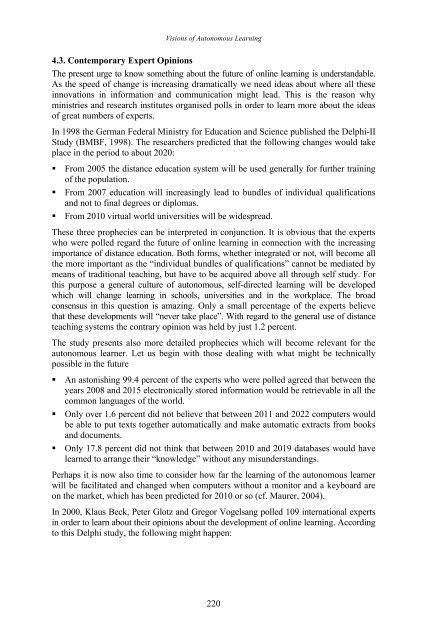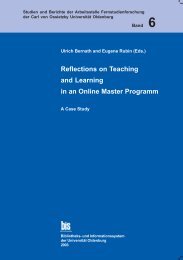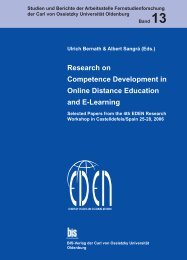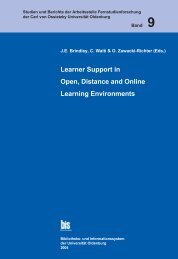Distance Education in Transition - Master of Distance Education ...
Distance Education in Transition - Master of Distance Education ...
Distance Education in Transition - Master of Distance Education ...
Create successful ePaper yourself
Turn your PDF publications into a flip-book with our unique Google optimized e-Paper software.
Visions <strong>of</strong> Autonomous Learn<strong>in</strong>g<br />
4.3. Contemporary Expert Op<strong>in</strong>ions<br />
The present urge to know someth<strong>in</strong>g about the future <strong>of</strong> onl<strong>in</strong>e learn<strong>in</strong>g is understandable.<br />
As the speed <strong>of</strong> change is <strong>in</strong>creas<strong>in</strong>g dramatically we need ideas about where all these<br />
<strong>in</strong>novations <strong>in</strong> <strong>in</strong>formation and communication might lead. This is the reason why<br />
m<strong>in</strong>istries and research <strong>in</strong>stitutes organised polls <strong>in</strong> order to learn more about the ideas<br />
<strong>of</strong> great numbers <strong>of</strong> experts.<br />
In 1998 the German Federal M<strong>in</strong>istry for <strong>Education</strong> and Science published the Delphi-II<br />
Study (BMBF, 1998). The researchers predicted that the follow<strong>in</strong>g changes would take<br />
place <strong>in</strong> the period to about 2020:<br />
� From 2005 the distance education system will be used generally for further tra<strong>in</strong><strong>in</strong>g<br />
<strong>of</strong> the population.<br />
� From 2007 education will <strong>in</strong>creas<strong>in</strong>gly lead to bundles <strong>of</strong> <strong>in</strong>dividual qualifications<br />
and not to f<strong>in</strong>al degrees or diplomas.<br />
� From 2010 virtual world universities will be widespread.<br />
These three prophecies can be <strong>in</strong>terpreted <strong>in</strong> conjunction. It is obvious that the experts<br />
who were polled regard the future <strong>of</strong> onl<strong>in</strong>e learn<strong>in</strong>g <strong>in</strong> connection with the <strong>in</strong>creas<strong>in</strong>g<br />
importance <strong>of</strong> distance education. Both forms, whether <strong>in</strong>tegrated or not, will become all<br />
the more important as the “<strong>in</strong>dividual bundles <strong>of</strong> qualifications” cannot be mediated by<br />
means <strong>of</strong> traditional teach<strong>in</strong>g, but have to be acquired above all through self study. For<br />
this purpose a general culture <strong>of</strong> autonomous, self-directed learn<strong>in</strong>g will be developed<br />
which will change learn<strong>in</strong>g <strong>in</strong> schools, universities and <strong>in</strong> the workplace. The broad<br />
consensus <strong>in</strong> this question is amaz<strong>in</strong>g. Only a small percentage <strong>of</strong> the experts believe<br />
that these developments will “never take place”. With regard to the general use <strong>of</strong> distance<br />
teach<strong>in</strong>g systems the contrary op<strong>in</strong>ion was held by just 1.2 percent.<br />
The study presents also more detailed prophecies which will become relevant for the<br />
autonomous learner. Let us beg<strong>in</strong> with those deal<strong>in</strong>g with what might be technically<br />
possible <strong>in</strong> the future<br />
� An astonish<strong>in</strong>g 99.4 percent <strong>of</strong> the experts who were polled agreed that between the<br />
years 2008 and 2015 electronically stored <strong>in</strong>formation would be retrievable <strong>in</strong> all the<br />
common languages <strong>of</strong> the world.<br />
� Only over 1.6 percent did not believe that between 2011 and 2022 computers would<br />
be able to put texts together automatically and make automatic extracts from books<br />
and documents.<br />
� Only 17.8 percent did not th<strong>in</strong>k that between 2010 and 2019 databases would have<br />
learned to arrange their “knowledge” without any misunderstand<strong>in</strong>gs.<br />
Perhaps it is now also time to consider how far the learn<strong>in</strong>g <strong>of</strong> the autonomous learner<br />
will be facilitated and changed when computers without a monitor and a keyboard are<br />
on the market, which has been predicted for 2010 or so (cf. Maurer, 2004).<br />
In 2000, Klaus Beck, Peter Glotz and Gregor Vogelsang polled 109 <strong>in</strong>ternational experts<br />
<strong>in</strong> order to learn about their op<strong>in</strong>ions about the development <strong>of</strong> onl<strong>in</strong>e learn<strong>in</strong>g. Accord<strong>in</strong>g<br />
to this Delphi study, the follow<strong>in</strong>g might happen:<br />
220





